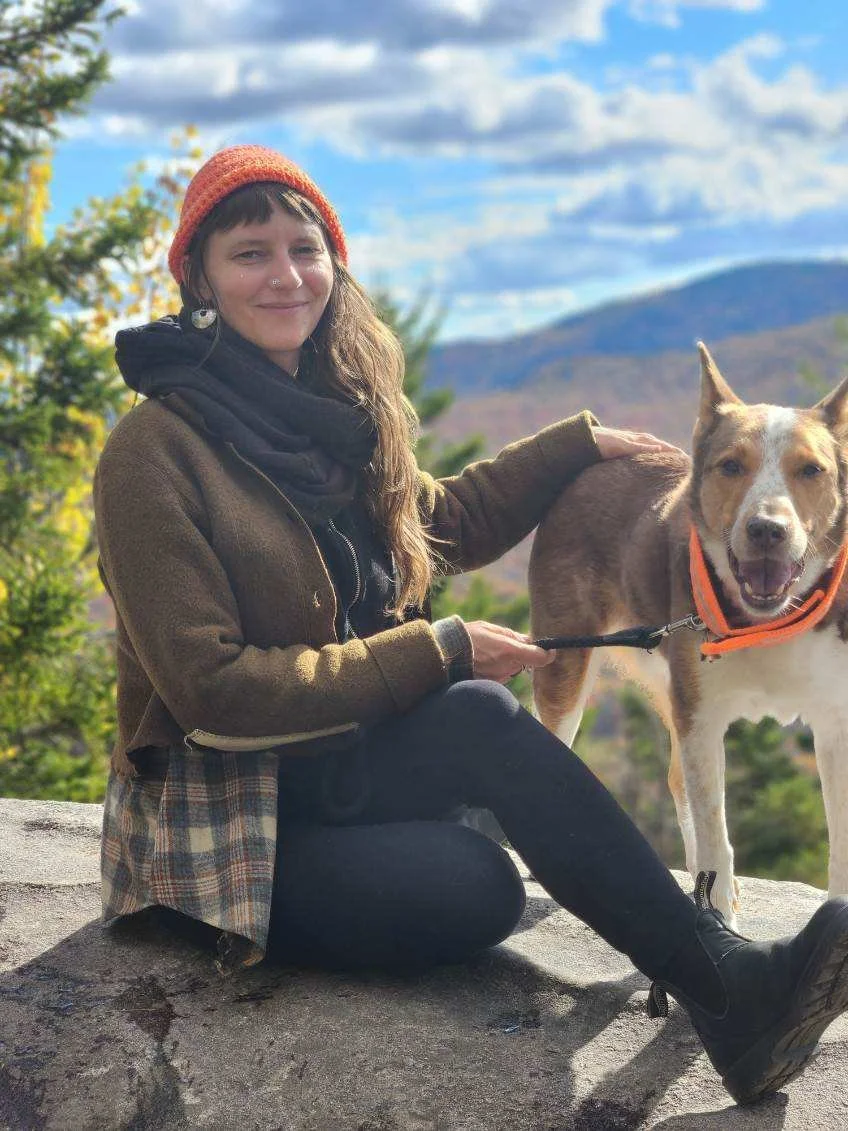Celeste
Memory and belonging
“Think about where we already are with climate change and all of the damage that has already been done. And think about all the damage that could be prevented if we stop this. And talk about it with your neighbors, about rekindling this connection.”
When a child grows up playing in the forest, that forest is part of them wherever they go, whether or not they remember. Celeste remembers. They were raised curiously exploring the forests and streams surrounding Cookeville, Tennessee. Their childhood home and hillside treehouse now lie in the “high impact zone” of Enbridge Inc.’s planned methane gas pipeline, dubbed the Ridgeline Pipeline, which is part of the Tennessee Valley Authority’s effort to replace its Kingston coal-fired power plants with a new methane gas plant.
As a kid, Celeste always played outside.
“I feel deeply connected to the land impacted by this pipeline,” Celeste says. They tell stories of Cummins Falls, Burgess Falls, Window Cliffs and so many other unique formations, including climbing and exploring the forested land owned by a family friend.
“There was a little creek that ran next to us,” they recall. “We were really close to many of these beautiful waterfalls and wooded areas to explore, and I just felt a really deep connection to that place and to that land and to the spirit of that place.”
Perhaps like many kids raised in rural areas, Celeste says, “I didn't realize how lucky I was until I moved away in my 20s and then came back and revisited things. I had been living in a city, and when I came back I understood how magical and special it was to have grown up there, how lucky I was to grow up surrounded by trees and forests and beautiful natural landscapes.”
Celeste feels strongly about protecting shared natural resources. They add, “It’s hard to even describe how it feels to try to defend something that feels so natural to defend — it seems like everyone should want to preserve our waterways and our land and all the animal habitats … and it’s just mind-boggling that this is even something we have to consider.”
They initially heard about the Ridgeline Pipeline from a family member. After doing some research, they learned about the ways that methane gas is extremely harmful to the environment and climate, much like coal and oil.
They are concerned about climate change and want to see TVA make decisions that are more responsible to the land. They point out, “It just seems to me like TVA is not seriously considering these other options, such as solar and wind. Also, it sounds to me like these gas pipelines would not create many jobs, and most of the jobs would be temporary anyway.”
A rock wall bordering a creek in the path of the Ridgeline pipeline near Celeste's childhood home.
Celeste has called multiple places home, including Louisiana, where they lived for several years and were aware of the construction of oil and gas pipelines. “Much of that area is now referred to as ‘Cancer Alley’ because of the horrible effects of those industries down there, and it’s heartbreaking,” they said.
Celeste currently resides in Vermont, where they are studying herbal medicine. Celeste is learning to employ a mixture of old medicine ways and new research that they will ultimately offer up to share with their community in accessible forms. They also work for a local food co-op, a café and an apothecary.
“I’ve been kind of trying to gain entryway to my ancestors and reaching for different outlets and doorways into the world of my ancestral path and where I came from. And a lot of that is Irish and Celtic peoples,” they share.
Celeste has been reading lately about the spiritual practices of Celtic peoples and exploring the idea of “mythic memory,” a concept that stitches the people of now together with their ancestors as well as with those who will come in the future, a kind of spiritual accountability.
“We have become, in this modern world, so disconnected from nature,” Celeste says. “And it’s not that nature is separate from us, but we’ve been taught that it is.”
Celeste calls on people to do all they can do to maintain the spirit of connection with nature and to resist attempts from the fossil fuel industry and wealthy corporations to destroy it. They say they are moved by “thoughtful and passionate people who are speaking out in favor of conservation so that future generations might know and care for the land, too.”
When asked how communities might encourage each other, Celeste says, “I would love to inspire my neighbors to get involved in whatever way they feel called to do so, even if that just means going out to these places and touching the trees and the plants and talking with the land and engaging with these places.”
By Holley Evergreen Roberts, based on a 2024 interview with Celeste (they/them)

